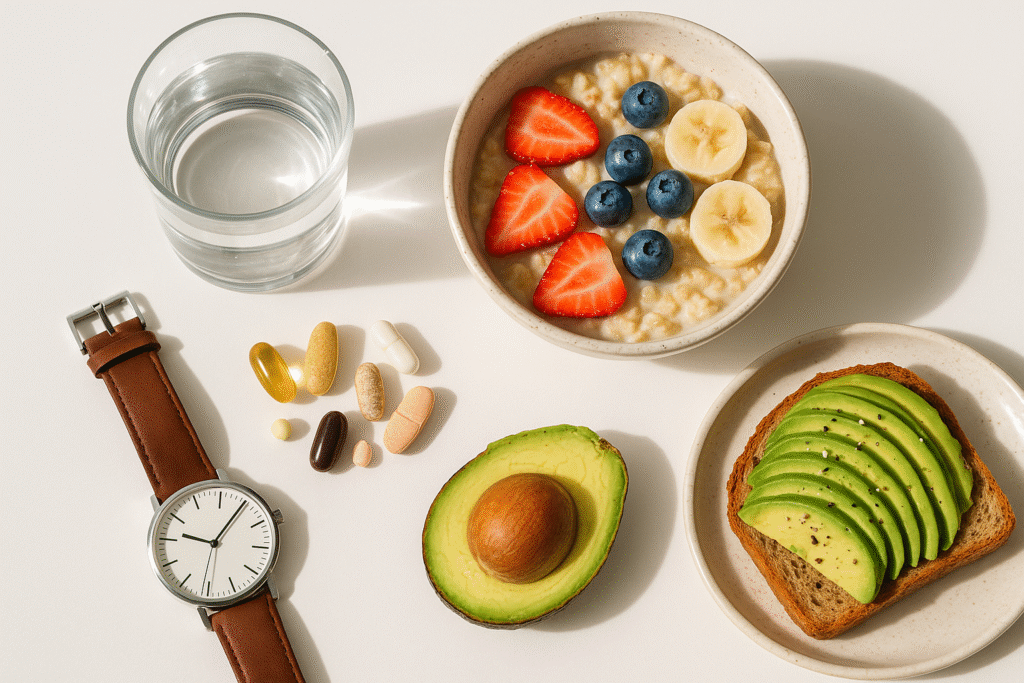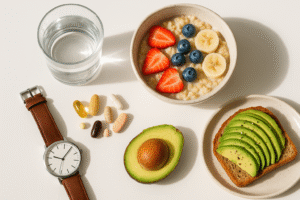Table of Contents
ToggleWhy Choosing the Best Time to Take Vitamins Matters?
The way your body absorbs vitamins depends on when and how you take them.
If you take a vitamin at the wrong time or in the wrong way, your body might not absorb it effectively—even if you’re taking the correct dosage.
The World Health Organization (WHO) and the U.S. Office of Dietary Supplements (ODS) confirm that effective nutrient absorption depends on timing and the nutritional context.
For example, the body can lose up to half of a vitamin’s potential benefits when taken without considering timing or meal composition.
That’s why it’s crucial to understand the best time to take vitamins—so your body can absorb them efficiently and you can maintain optimal energy, immunity, and health.
What Are Vitamins and Why Does the Body Need Them?
Vitamins are essential micronutrients that the body needs for metabolism, immunity, cell repair, and growth.
They’re divided into two main categories, each requiring different conditions for proper absorption.
The Difference Between Water-Soluble and Fat-Soluble Vitamins
Scientists classify vitamins into two groups, and each group behaves differently in the body.
1. Water-Soluble Vitamins:
These include vitamin C and all B-complex vitamins (B1, B2, B3, B6, B12, and folic acid).
The body uses them daily because it does not store them for long; it excretes any excess through urine.
To improve absorption, take water-soluble vitamins early in the morning with a glass of water.
Starting your day with vitamins B and C boosts energy, focus, and alertness.
Research from the National Institutes of Health (NIH) shows that the absorption of vitamin C decreases when consumed with a high-fat meal.
So, it’s best to take these vitamins before eating or after a light, low-fat snack.
For more details on absorption, read: “How Vitamins Are Absorbed in the Body – Water vs. Fat-Soluble Vitamins.”
2. Fat-Soluble Vitamins:
This group includes vitamins A, D, E, and K.
The body needs dietary fat to absorb these vitamins properly.
You should take them with a meal that contains healthy fats—like avocado, olive oil, or nuts.
If you take these vitamins on an empty stomach, your body will absorb very little of them.
The liver and fat tissues store these vitamins for later use, so daily intake isn’t always necessary unless prescribed by your doctor.
WHO Recommendation:
Consume these vitamins with 10–15 grams of healthy fat to boost absorption by up to 70%.
Best Time to Take Vitamins:
Vitamin C:
Vitamin C strengthens the immune system and improves iron absorption.
Doctors recommend taking it in the morning or right after breakfast, as this helps increase energy and alertness.
Taking vitamin C after a meal helps reduce stomach irritation.
Experts also advise avoiding it before bedtime since it may slightly boost alertness.
Medical Insight:
When consumed with plant-based iron sources like lentils or spinach, vitamin C can increase iron absorption by up to 67%, according to NIH reports.
Vitamin D:
Vitamin D helps your body absorb calcium and supports bone and immune health.
Take it with a meal that contains healthy fats, such as lunch or dinner.
Studies from the Office of Dietary Supplements (ODS) show that taking vitamin D with fat increases absorption threefold compared to taking it on an empty stomach.
Try to take it at the same time every day to stabilize its levels in your blood.
If you take vitamin D consistently after lunch, your body will adjust and absorb it more efficiently.
B Vitamins (B1–B12):
B vitamins play a vital role in energy production, brain function, and nerve health.
The best time to take them is early in the morning, ideally 30 minutes before a meal.
They help boost focus and mental performance throughout the day.
Many people take vitamin B12 before breakfast, as the stomach absorbs it more efficiently when empty.
If you have a sensitive stomach, you can take it with a light meal.
ODS Advice:
Avoid taking B vitamins after 6 p.m., as they can stimulate the nervous system and disrupt sleep.
Best Time to Take Vitamins A, E, and K:
These vitamins work together to support skin, bone, and immune health.
Doctors recommend taking them during lunch or dinner with foods containing healthy fats.
A meal with natural fats—like cheese, olive oil, or avocado—improves the body’s ability to absorb them.
Avoid taking these vitamins alongside iron or zinc supplements to prevent reduced absorption.
Best Time to Take Vitamins (Multivitamins):
Multivitamins contain a blend of both water- and fat-soluble nutrients,
so the best time to take them is with a balanced meal that includes healthy fats—usually lunch or dinner.
Fat helps absorb vitamins D, E, and A, while water and digestive enzymes aid in absorbing B and C vitamins.
If you take multivitamins on an empty stomach, you may experience nausea or poor absorption.
It’s best to take them immediately after eating with a full glass of water.
ODS Tip:
Consistency matters more than exact timing.
Taking your multivitamin at the same time every day helps your body regulate nutrient use more efficiently.
Difference Between Natural Vitamins and Supplements:
Natural vitamins come from whole foods, while supplements are lab-made forms designed to fill nutritional gaps.
Your body usually absorbs natural sources better, but supplements remain necessary for those with deficiencies, dietary restrictions, or medical conditions that affect nutrient absorption.
Best Time to Take Vitamin B12 for Energy:
Vitamin B12 is one of the most important nutrients for energy and nervous system function.
Doctors recommend taking it early in the morning before breakfast for faster absorption and better results without affecting sleep quality.
Starting your day with B12 enhances focus, alertness, and overall vitality.
People with sensitive stomachs can take it with a small snack to avoid discomfort.
NIH studies show that B12 absorption peaks on an empty stomach, especially when taken sublingually (under the tongue) or via injection.
Best Time to Take Zinc for Immunity Support:
Zinc strengthens the immune system, promotes wound healing, and supports brain function.
Doctors recommend taking it after a meal rather than on an empty stomach to avoid nausea.
Avoid taking zinc simultaneously with calcium or iron supplements, as these minerals compete for absorption in the intestines.
Leave at least a two-hour gap between zinc and other mineral supplements for optimal results.
For more details, read: “The Role of Vitamins in Boosting Immunity – Key Types and Natural Sources.”
Vitamins You Can Take Together for Better Absorption:
Some vitamins work synergistically when taken together. Here are the most effective combinations:
-
Vitamin C + Iron: Vitamin C dramatically improves iron absorption.
-
Vitamin D + Calcium: Vitamin D enhances calcium uptake, promoting strong bones.
-
Vitamin K + Vitamin D: Vitamin K directs calcium to bones instead of arteries.
-
B-Complex Vitamins: The B vitamins work best together for improved metabolism, mood, and energy.
Vitamins You Shouldn’t Take Together:
Certain combinations can interfere with each other’s absorption:
- Iron + Calcium: Calcium blocks iron absorption in the gut.
- Zinc + Copper: High zinc doses reduce copper absorption.
- Iron + Coffee or Tea: Caffeine and tannins in these drinks can reduce iron absorption by up to 50%.
- Calcium + Zinc or Magnesium: These minerals compete for the same absorption pathways.
To avoid this, separate these supplements by at least two hours.
Best Time to Take Vitamins by Health Goal:
- For Energy: Take B vitamins—especially B12—early in the morning.
- For Immunity: Take vitamin C and zinc after breakfast.
- For Bone Health: Take vitamin D and calcium during lunch or dinner.
- For Better Sleep: Take magnesium or vitamin B6 about an hour before bedtime.
- For Hair and Skin Health: Take vitamins E and B7 (biotin) with a meal containing healthy fats.
Practical Tips to Improve Vitamin Absorption:
-
Take fat-soluble vitamins with meals that contain natural fats.
-
Drink plenty of water when taking water-soluble vitamins.
-
Avoid coffee or tea for at least two hours after taking supplements.
-
Split large supplement doses to reduce stomach irritation.
-
Take your vitamins at the same time every day for consistency.
-
Consult your doctor before combining multiple supplements.
-
Stick to the recommended dosage to prevent fat-soluble vitamin buildup.
Conclusion: How to Choose the Best Time to Take Vitamins Daily.
The success of any supplement depends on consistent timing, not just dosage.
When you understand each vitamin’s nature—whether water- or fat-soluble—you can create a personalized schedule for maximum absorption.
Start your day with vitamins B and C, take vitamins D, E, and A with your main meal,
and separate zinc and iron supplements to prevent absorption issues.
By following these steps, you’ll strengthen your immunity, maintain your energy, and make every vitamin truly work for you.
FAQs:
1. Can I take all vitamins at once?
No. Some vitamins and minerals—like iron and calcium—interfere with each other’s absorption.
2. What’s the best time to take vitamin D?
With a main meal that includes healthy fats, such as lunch or dinner.
3. Can I take vitamin B12 before bed?
No, because it may increase alertness and affect your sleep.
4. Does coffee affect vitamin absorption?
Yes, especially iron and zinc. Wait two hours after taking supplements before drinking coffee.
5. Should I take vitamins every day?
Water-soluble vitamins should be taken daily; fat-soluble ones can be taken as prescribed by your doctor.
6. What are signs of poor vitamin absorption?
Fatigue, hair loss, brittle nails, or persistently dark urine after taking supplements.
7. What are common symptoms of vitamin deficiency?
Read our detailed article: “Vitamin Deficiency Symptoms: Key Signs You Shouldn’t Ignore.”
References
PharmD with expertise in pharmaceuticals and a passion for making medical knowledge clear, accurate and accessible to all








